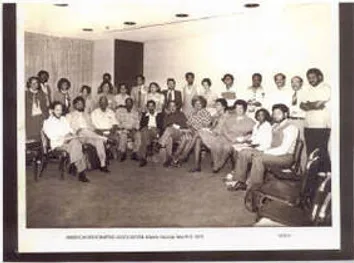
The struggles, social conditions of Black Americans, professional experiences, and the barriers faced by Black psychiatrists provided the thrust for our creation.
Since the graduation of Solomon Carter Fuller from Boston University School of Medicine in 1897, and for the next eight decades, Black psychiatrists have persistently struggled to impact and effect change in American psychiatry. In the 1960s, it became increasingly evident that the traditional government and professional organizations were not responsive to the ever-evolving priorities of the African American community and their mental health needs.
Officially founded in 1969 after meetings began in the mid to late 1960s, the Founders of the BPA understood the importance of moving progressively to ensure the emotional and psychological development of African Americans. To accomplish this goal, the Founders sought to provide tools for African Americans to cope and succeed in the face of persistent racism.
The National Institute of Mental Health (NIMH), in response to the demands of the BPA, established the NIMH Center for Minority Group Mental Health Programs. The American Psychiatric Association (APA), the major psychiatric professional organization, was tenaciously challenged by the BPA for its apathy and neglect of psychiatric and social ills confronting African Americans.
The direction of the BPA is dictated by the growth of our organization and the present dilemmas facing African Americans. The initial and continuing philosophy is to effect change in American psychiatry for the betterment of African Americans and the country as a whole.
The mission of The Black Psychiatrists of America is to address issues affecting the mental health of African people worldwide with special emphasis on persons of African descent in the Americas and to provide a forum for continuing education for those who provide psychiatric care to these underserved population groups.
